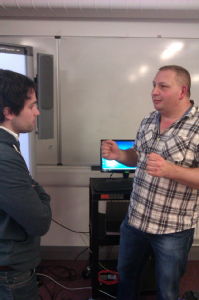Global Media and Communication 2.0

The new term started for students on our GMC course with a talk from a visiting researcher - Dr. William Merrin, Senior Lecturer in the Department of Politics and Cultural Studies at the University of Swansea. William’s talk on Media Studies 2.0 threw our newly arrived students into the deep end of debates they will be wrestling with over the coming weeks and months – about the profound social, political and cultural issues underpinning the ever-changing media and technological landscape and, as interestingly, about the role of Media Studies as an academic discipline which doesn’t just reflect on these issues, but has been, throughout its history, active – and even complicit- in shaping them.
William’s whizz through the history of the development of media technologies emphasised that the contemporary mediaworld had been shaped by the coalescing of two different stories of innovation – one focussed around technologies of broadcasting and one around computing. These developments were not just a consequence of brilliant inventors providing technological solutions to practical problems – they were also bound up with cultural processes and assumptions about the best ways to communicate and the best ways to manage information in complex societies. It is the convergence of these stories in the late 20th/early 21st century which marks the distinctiveness of this period, as the computing side of the story squeezes out the broadcasting side. Whilst TV, radio, film and print– the dominant media in Media Studies 1.0 might look and sound like they did before – to audiences (or users as William suggests they might better be called) and to academics in this field - they are now, almost exclusively, produced and circulated through digital code.
This accelerated convergence has a number of paradoxes within it. On the one hand it appears to bring enormous opportunities for more access to the technologies of media production, which escape the traditional relationships between communication, order and power (William showed us a YouTube video made by his 10 year old son, explicitly against his parental wishes). These are means of mental and symbolic production not available to the audiences of recent history. On the other hand, the audience of the past could be anonymous if it wished. The users of the present, by contrast, leave their digital traces for commercial and state interests to feed on –so that even in benign liberal democracies like the UK our Facebook likes become a commercial resource over which we or indeed our elected representatives have limited control and your Twitter feed might land you in jail.
The professional expertise of scholars in Media Studies has been bound up with texts, representation and audiences. In Media Studies 2.0 these might not be where the urgency of debates are, in comparison to knowledge about regulatory frameworks or access to the means to understand and re-work code (to hack, in other words). For those in the arts and humanities more generally, interested in the consequences of the digital, these are important challenges, which raise questions about our focus and priorities and about the kinds of skills students – and indeed teachers – might need to live and work in this emerging media infrastructure in ways which might help shape it for the future.
It was a provocative presentation, and William was good enough to share chapters from his forthcoming book with us. He also shows an enviable commitment to how Media Studies 2.0 might challenge traditional models of gatekeeping and authorial academic authority by blogging them here.
For us in CCPS this year also represents Global Media and Communication 2.0. Our founding director Jonathan Vickery is concentrating on developing a new MA program on Arts, Enterprise and Development and Joanne Garde-Hansen has taken over as our Course Director this year. I’ll record my thanks to Jonathan for his work in setting up and managing the programme for the last two years and look forward to working with Jo. I hope that, on GMC this year, as teachers and students, we can try and rise to William’s challenge.
 David Wright
David Wright


 Loading…
Loading…
Add a comment
You are not allowed to comment on this entry as it has restricted commenting permissions.